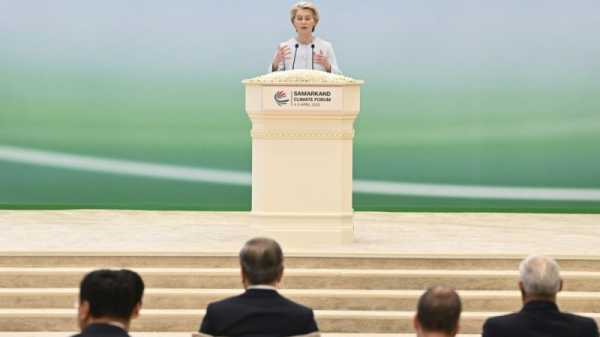
Spain’s Supreme Court is investigating former Catalan President Carles Puigdemont, who has been on the run since Catalonia’s 2017 secession attempt, in relation to terrorism, a move that puts extra pressure on Prime Minister Pedro Sánchez, who relies on the separatist’s support to stay in power.
According to the court, the investigation also involves Catalan regional parliament member Ruben Wagensberg, a separatist activist who fled to Switzerland earlier this year, Euractiv’s partner EFE reported.
The Spanish judicial investigation will focus on actions carried out in 2019 by activists of the radical Catalan separatist movement Democratic Tsunami in protest against a court ruling that sentenced several separatist leaders to prison but was pardoned by Sanchez in 2021.
“On the same day that I was accused of having received a gift of a €7,000 Rolex, I was charged as a terrorist. I think all that’s missing now is a (bank) account in Panama. The Spanish judicial Matrix has adapted the maxim of bad journalism: don’t let reality spoil a good indictment (story)”, wrote Puigdemont on X in response to the Supreme Court’s decision.
Both Puigdemont, leader of the right-wing separatist party Together for Catalonia (JxCat), and Ruben Wagensberg must appear in court “as investigated, with all the rights and guarantees provided for in our legal system”, the judges said on Thursday.
‘Terrorism’ is not only ETA or the Jihad
Wagensberg and Puigdemont, who are MEPs, currently enjoy parliamentary immunity.
The Supreme Court’s move comes after a fierce dispute among top legal experts over whether Puigdemont can be investigated and eventually convicted for terrorism crimes, a concept that has also sparked deep debate.
According to the judge, there is “no doubt” that some violent events that took place in 2019, for which Democratic Tsunami and ultimately Puigdemont are held responsible as possible “intellectual authors”, including the blockade of Barcelona airport by several separatist demonstrators, correspond to a “crime of terrorism”.
To back up their opinion, the Supreme Court judges made it clear that the opinion of some media and some politicians (from the left) that “only the actions of (the Basque terrorist group) ETA (now disbanded) or Jihad deserve to be treated as terrorism, is incompatible with the definition of terrorism derived” from Article 573 of the Spanish Penal Code.
A ‘perfect storm’ over Sánchez
The Supreme Court’s decision to investigate the former Catalan president comes as a controversial amnesty law to pardon hundreds of Catalan separatists involved in illegal actions between 2012 and 2023 is being processed in parliament and could also cover terrorism offences.
Puigdemont and the other main Catalan separatist party, as well as its political rival, the Republican Left of Catalonia (ERC), are demanding that Sánchez include terrorist crimes in the text of the future extraordinary rule of law in exchange for the prime minister and PSOE leader’s parliamentary support, which is essential to ensure the stability of the four-year legislature.
The Spanish Supreme Court’s decision adds further strain to Sánchez’s government, which has been facing a serious reputation and image crisis since last week following the outbreak of a major corruption scandal involving former transport minister José Luis Ábalos, who was the prime minister’s right-hand man for several years in previous governments.
(Fernando Heller | EuroEFE.Euractiv.es)
Read more with Euractiv

Portugal at crossroads as far-right advances ahead of snap electionsAfter Portugal’s snap elections on 10 March, the nation may be at a crossroads in forming a government, given the exponential growth of the far right, from which all other parties promise to keep their distance.
Subscribe to our EU 2024 Elections newsletter
Email Address * Politics Newsletters
Source: euractiv.com



